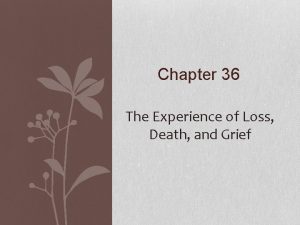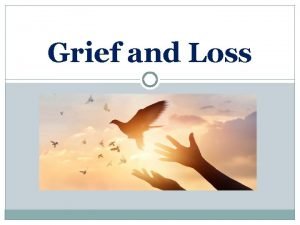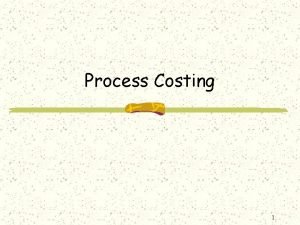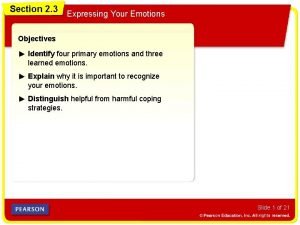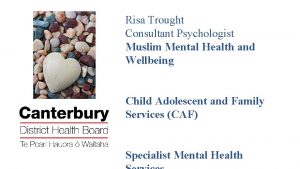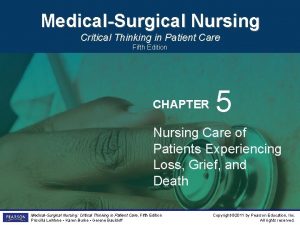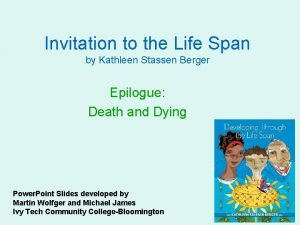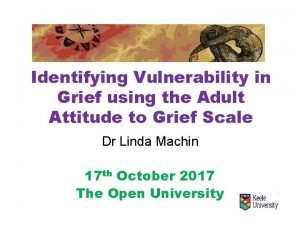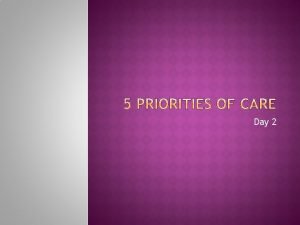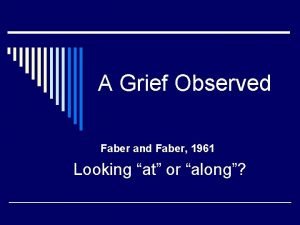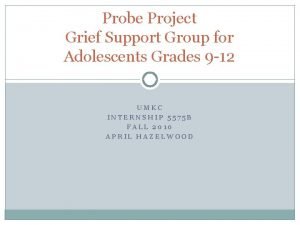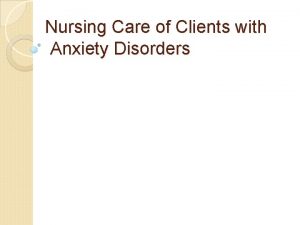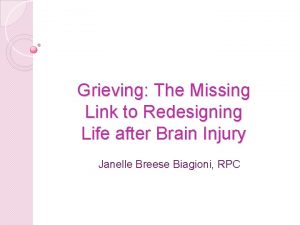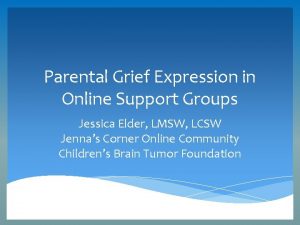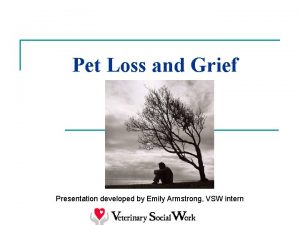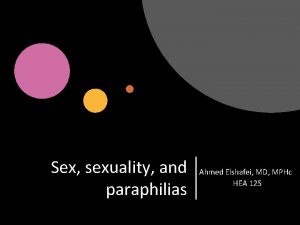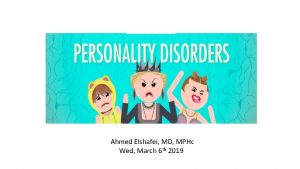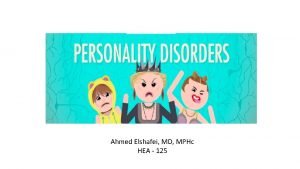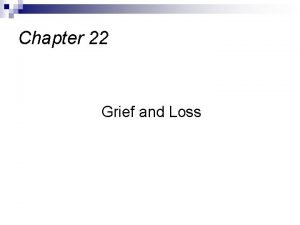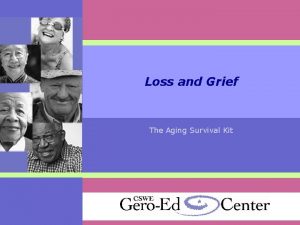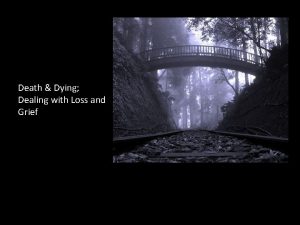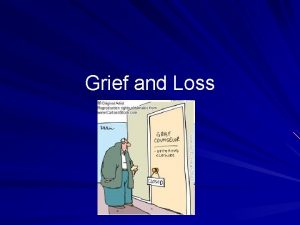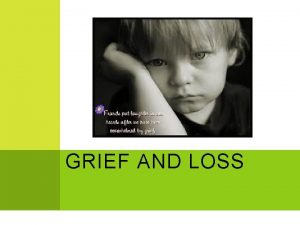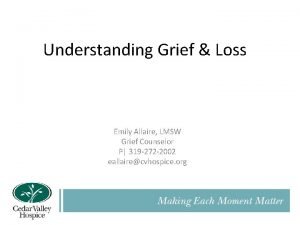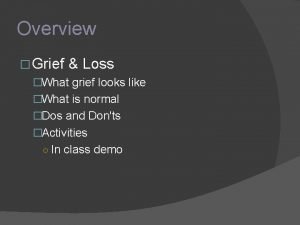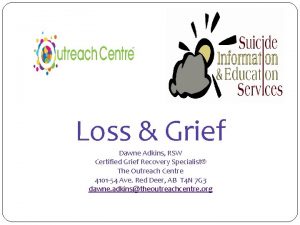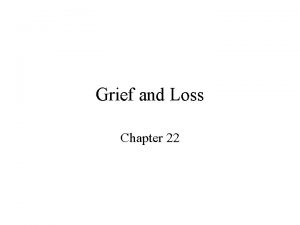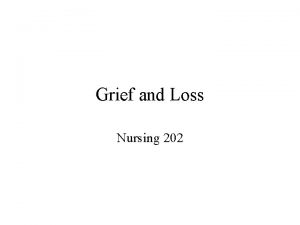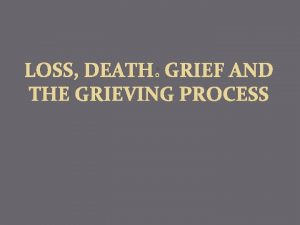Loss and grief Ahmed Elshafei MD MPHc Seattle






























- Slides: 30

Loss and grief Ahmed Elshafei MD, MPHc Seattle Central College



Grief Ø Grief is a natural response to loss. Ø It’s the emotional suffering you feel when something or someone you love is taken away. Ø The more significant the loss, the more intense your grief will be.

Grief vs depression


Causes of grief 1. Divorce or relationship breakup 2. Loss of health 3. Losing a job 4. Loss of financial stability 5. A miscarriage 6. Retirement 7. Death of a pet 8. Loss of a cherished dream 9. A loved one’s serious illness 10. Loss of a friendship 11. Loss of safety after a trauma 12. Selling the family home

What happens after a loss?

Stages

Ø Grieving is a highly individual experience; there’s no right or wrong way to grieve. Ø How you grieve depends on many factors, including your personality and coping style, your life experience, your faith, and how significant the loss was to you. Ø Grieving process takes time. Healing happens gradually; it can’t be forced!

Ø Some people start to feel better in weeks or months. ØFor others, the grieving process is measured in years. ØWhatever your grief experience, it’s important to be patient with yourself and allow the process to naturally unfold.

s vs facts Myth: The pain will go away faster if you ignore it. Fact: Trying to ignore your pain or keep it from surfacing will only make it worse in the long run. For real healing, it is necessary to face your grief and actively deal with it. Myth

s vs facts Myth: It’s important to “be strong” in the face of loss. Fact: Feeling sad, frightened, or lonely is a normal reaction to loss. Crying doesn’t mean you are weak. You don’t need to “protect” your family or friends by putting on a brave front. Showing your true feelings can help them and you. Myth

s vs facts Myth: If you don’t cry, it means you aren’t sorry about the loss. Fact: Crying is a normal response to sadness, but it’s not the only one. Those who don’t cry may feel the pain just as deeply as others. They may simply have other ways of showing it. Myth

s vs facts Myth: Grieving should last about a year. Fact: There is no specific time frame for grieving. How long it takes differs from person to person. Myth

Myth vs fact Myth: Moving on with your life means forgetting about your loss. Fact: Moving on means you’ve accepted your loss—but that’s not the same as forgetting. You can move on with your life and keep the memory of someone or something you lost as an important part of you. In fact, as we move through life, these memories can become more and more integral to defining the people we are.

Dealing with the grieving process Acknowledge your pain Accept that grief can trigger many different and unexpected emotions Understand that your grieving process will be unique to you.

Dealing with the grieving process Seek out face-to-face support from people who care about you Support yourself emotionally by taking care of yourself physically Recognize the difference between grief and depression

Stages The five stages of grief: 1) Denial: “This can’t be happening to me. ” 2) Anger: “Why is this happening? Who is to blame? ” 3) Bargaining: “Make this not happen, and in return I will ____. ” 4) Depression: “I’m too sad to do anything. ” 5) Acceptance: “I’m at peace with what happened. ”

Symptoms of grief Emotional symptoms of grief: - Shock and disbelief. - Sadness - Guilt

Symptoms of grief Emotional symptoms of grief: - Anger - Fear

Symptoms of grief Physical symptoms of grief: • Fatigue • Nausea • Lowered immunity • Weight loss or weight gain • Aches and pains • Insomnia

When grief doesn’t go away As time passes following a significant loss, such as the death of a loved one, it’s normal for feelings of sadness, numbness, or anger to gradually ease. These and other difficult emotions become less intense as you begin to accept the loss and start to move forward with your life.

When grief doesn’t go away However, if you aren’t feeling better over time, or your grief is getting worse, it may be a sign that your grief has developed into a more serious problem, such as complicated grief or major depression.

Complicated grief The sadness of losing someone you love never goes away completely, but it shouldn’t remain center stage. If the pain of the loss is so constant and severe that it keeps you from resuming your life, you may be suffering from a condition known as complicated grief.

Complicated grief Symptoms of complicated grief include: • Intense longing and yearning for your deceased loved one • Intrusive thoughts or images of your loved one • Denial of the death or sense of disbelief • Imagining that your loved one is alive

Complicated grief Symptoms of complicated grief include: • Searching for your deceased loved one in familiar places • Avoiding things that remind you of your loved one • Extreme anger or bitterness over your loss • Feeling that life is empty or meaningless

The difference between grief and depression: Distinguishing between grief and clinical depression isn’t always easy as they share many symptoms, but there are ways to tell the difference. Remember, grief can be a roller coaster. It involves a wide variety of emotions and a mix of good and bad days. Even when you’re in the middle of the grieving process, you will still have moments of pleasure or happiness. With depression, on the other hand, the feelings of emptiness and despair are constant.

The difference between grief and depression: Other symptoms that suggest depression, not just grief, include: • Intense, pervasive sense of guilt • Thoughts of suicide or a preoccupation with dying • Feelings of hopelessness or worthlessness • Slow speech and body movements • Inability to function at home, work, and/or school • Seeing or hearing things that aren’t there

 Lesson 3 coping with loss and grief
Lesson 3 coping with loss and grief Chapter 36 loss and grief
Chapter 36 loss and grief Seven stages of grief
Seven stages of grief Ahmed muhudiin ahmed
Ahmed muhudiin ahmed Wordens task of mourning
Wordens task of mourning Normal loss treatment in process costing
Normal loss treatment in process costing The three learned emotions are grief, shame, and
The three learned emotions are grief, shame, and Children grief
Children grief Engels model of grief
Engels model of grief Absent greif
Absent greif Adult attitude to grief scale
Adult attitude to grief scale Types of grief
Types of grief Grief is like an earthquake
Grief is like an earthquake Engels model of grief
Engels model of grief Grief wheel
Grief wheel A grief observed summary
A grief observed summary Ice breakers for grief support groups
Ice breakers for grief support groups Assura inc
Assura inc Ambiguous grief definition
Ambiguous grief definition Anxiety disorder nursing diagnosis
Anxiety disorder nursing diagnosis Nothing gold can stay paraphrase
Nothing gold can stay paraphrase Grief
Grief Grief
Grief What was emily dickinson's childhood like
What was emily dickinson's childhood like Psalms for grief
Psalms for grief Ambiguous grief
Ambiguous grief Grief support
Grief support Disenfranchised grief losses
Disenfranchised grief losses Do you think rowdy and junior will remain friends
Do you think rowdy and junior will remain friends Tonkin model of grief
Tonkin model of grief Seattle university school of theology and ministry
Seattle university school of theology and ministry

